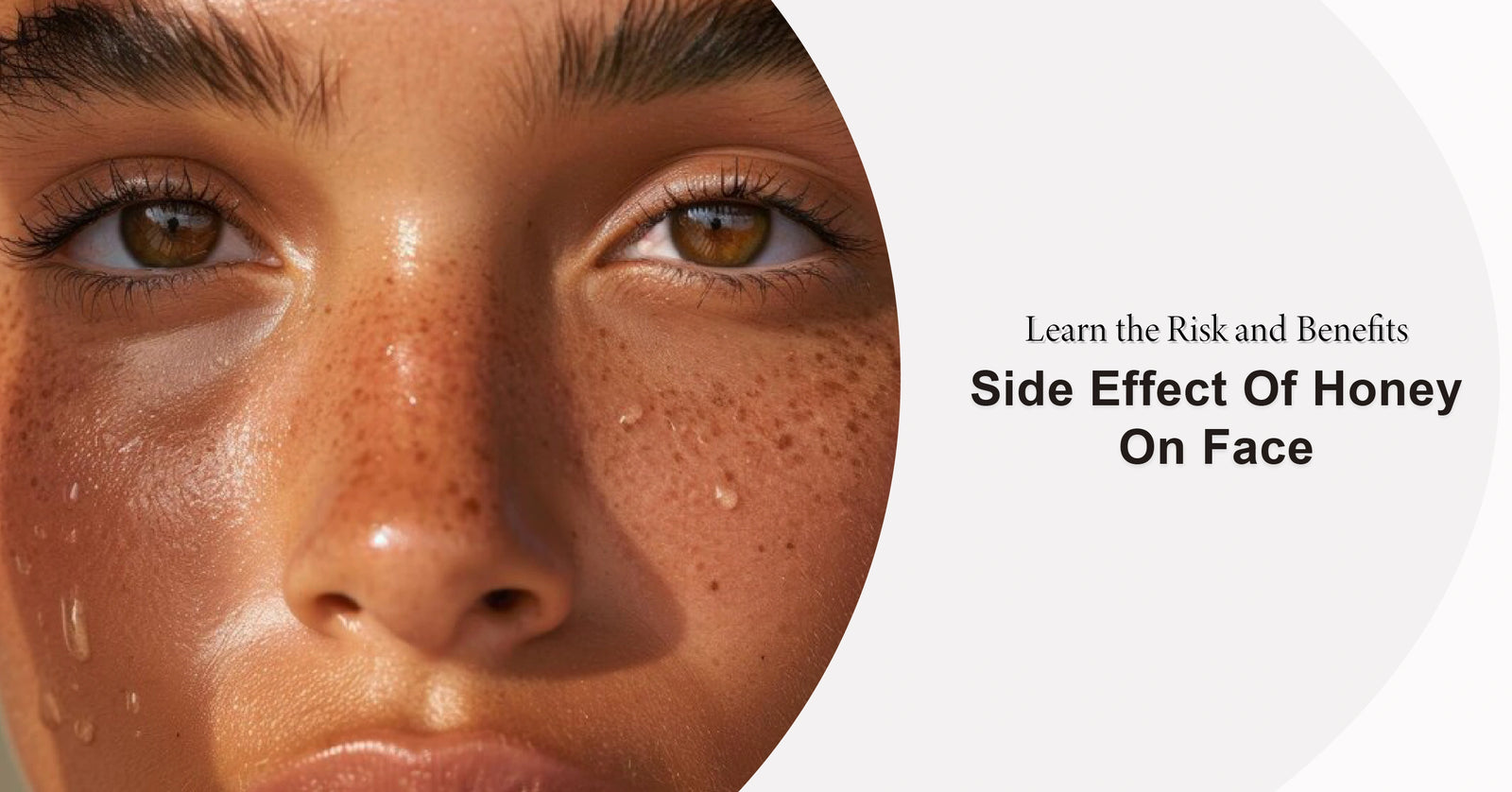Side Effects of Honey on Face: Learn the Risks and Benefits

Our faces are our most visible feature, often the first thing people notice about us. We all desire clear, radiant skin, and it’s no surprise that honey, especially Manuka honey, has been touted as a magical remedy in skincare.
Its natural properties make it a go-to ingredient for those seeking a glowing complexion. However, while honey can be incredibly beneficial, it’s essential to understand that it may not suit everyone.
This blog aims to provide a balanced perspective on using honey for skin care, exploring its benefits and potential risks. By the end, you'll be equipped to decide whether honey is the right fit for your skincare routine.
First, Consider Which Honey Suits Your Skin
Before you start slathering honey on your face, it’s crucial to identify which honey is best for your skin. The market offers a variety of honey types, including clover honey, wildflower honey, buckwheat honey, orange blossom honey, and the much-celebrated Manuka honey. Not all honey is created equal, and not all types suit every skin type.
To determine the best honey for your skin, conduct a patch test. Apply a small amount of honey on a discreet area of your skin, such as your wrist or ear. Leave it on for a few minutes, then rinse off and observe your skin's reaction. If no redness or irritation occurs, you’re likely safe to use it on your face.
Benefits of Honey for the Skin
Honey, particularly Manuka honey, has a wealth of skin benefits. It’s a natural humectant, drawing moisture into the skin and making it an excellent choice for dry or dehydrated skin. Here are some of the key benefits:
- Soothes Eye Irritation: Diluted honey can soothe minor eye irritations. Its anti-inflammatory properties help calm redness and swelling.
- Anti-ageing Solution: Honey is packed with antioxidants, which help fight free radicals and slow down the ageing process. Regular use can reduce the appearance of fine lines and wrinkles.
- Natural Glow: Manuka honey can give your skin a natural glow by nourishing and hydrating it deeply, leaving you with a fresh and radiant complexion.
Risks and Side Effects of Honey on the Skin
Despite its numerous benefits, honey isn’t suitable for everyone. Some people may experience allergic reactions or other side effects, particularly if they have sensitive skin or are allergic to bees. Here’s what you should watch out for:
- Allergic Reactions: Although rare, some individuals may be allergic to honey. Symptoms can include redness, rashes, and swelling. Doing a patch test before applying honey to your face is important.
- Messiness: Honey is sticky, and if left on the skin for too long, it can create a mess, especially if applied overnight. It may also stick to your bedding and pillows.
- Clogged Pores: For those with oily or acne-prone skin, leaving honey on the face overnight may clog pores, leading to breakouts. Honey can also be comedogenic for some people, trapping dirt and oil in the pores.
- Skin Irritation: If honey is left on the skin for too long, it may irritate, especially around sensitive areas like the eyes. It is crucial to monitor your skin and discontinue use if any irritation occurs.
- Infection Risk: Applying honey to broken skin or wounds can increase the risk of infection, particularly if the honey is not sterile. Always ensure your skin is clean before applying honey.
Side Effects of Leaving Honey On Face Overnight
While Manuka honey has many benefits, leaving it on your face overnight might not be the best idea, especially if you have sensitive or oily skin. Here are some potential risks:
- Allergic Reaction: If your skin is sensitive to honey, leaving it on overnight can exacerbate allergic reactions, causing redness, swelling, and rashes.
- Messiness: Honey can easily transfer to your bedding, creating a sticky mess that’s difficult to clean.
- Clogged Pores: For those with oily skin, honey can clog pores if left on for too long, leading to breakouts and enlarged pores.
- Skin Irritation: Prolonged exposure to honey can irritate, especially around sensitive areas like the eyes.
- Infection Risk: Applying honey to broken skin overnight increases the risk of infection, particularly if the honey is not sterile.
Pro-Tips To Benefit from Manuka Honey
To make the most of Manuka honey while minimising potential risks, follow these tips:
- Select High-Quality Honey: Choose a trusted brand like Sunhighlands Australia Manuka Honey, which is UMF certified and labelled with MGO content, ensuring you get the highest quality honey.
- Know Your Skin Type: Understanding your skin type is crucial in determining how honey will affect your skin. What works for one person may not work for another.
- Apply in Moderation: Use honey sparingly. Apply it for 20-30 minutes and then rinse off. Avoid leaving it on overnight unless you have a strong recommendation from a skincare professional.
Conclusion
Honey, particularly Manuka honey, can be a fantastic addition to your skincare routine, offering various benefits from anti-ageing to hydration. However, it’s essential to be aware of the potential side effects, especially if you have sensitive or oily skin. Always conduct a patch test and consult a skincare professional if unsure.
Your choice of honey, the method of application, and the duration you leave it on your skin will determine whether you experience the glowing benefits of this natural elixir or encounter some of its potential downsides. Stay informed, stay cautious, and confidently enjoy honey's natural goodness!





